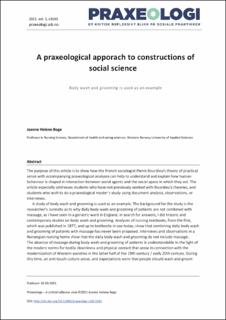| dc.contributor.author | Boge, Jeanne Helene | |
| dc.date.accessioned | 2021-10-12T13:04:14Z | |
| dc.date.available | 2021-10-12T13:04:14Z | |
| dc.date.created | 2021-08-30T12:42:44Z | |
| dc.date.issued | 2021 | |
| dc.identifier.citation | Boge, J. H. (2021). A praxeological approach to constructions of social science. Praxeologi – Et kritisk refleksivt blikk på sosiale praktikker, 3. | en_US |
| dc.identifier.issn | 2535-6437 | |
| dc.identifier.uri | https://hdl.handle.net/11250/2789362 | |
| dc.description.abstract | The purpose of this article is to show how the French sociologist Pierre Bourdieu's theory of practical sense with accompanying praxeological analyses can help to understand and explain how human behaviour is shaped in interaction between social agents and the social space in which they act. The article especially addresses students who have not previously worked with Bourdieu's theories, and students who wish to do a praxeological master's study using document analysis, observations, or interviews.
A study of body wash and grooming is used as an example. The background for the study is the researcher’s curiosity as to why daily body wash and grooming of patients are not combined with massage, as I have seen in a geriatric ward in England. In search for answers, I did historic and contemporary studies on body wash and grooming. Analyses of nursing textbooks, from the first, which was published in 1877, and up to textbooks in use today, show that combining daily body wash and grooming of patients with massage has never been proposed. Interviews and observations in a Norwegian nursing home show that the daily body wash and grooming do not include massage.
The absence of massage during body wash and grooming of patients is understandable in the light of the modern norms for bodily cleanliness and physical contact that arose in connection with the modernization of Western societies in the latter half of the 19th century / early 20th century. During this time, an anti-touch culture arose, and expectations were that people should wash and groom themselves. Textbook authors and nursing staff seem to have incorporated such modern bodily norms as a practical sense that unconsciously control their navigations.
Combinations of body wash and grooming with massage were heterodox practices introduced by nurse Helen Passant at the ward she managed. When Passant left, the former orthodoxy was restored. This means that the combination of body wash and massage is no longer practiced. | en_US |
| dc.language.iso | eng | en_US |
| dc.publisher | Bergen Open Access Publishing | en_US |
| dc.rights | Navngivelse 4.0 Internasjonal | * |
| dc.rights.uri | http://creativecommons.org/licenses/by/4.0/deed.no | * |
| dc.subject | Bourdieus theory practical sence | en_US |
| dc.subject | Bourdieus theory - practical sence | en_US |
| dc.subject | Bourdieu praxeological analysis | en_US |
| dc.subject | Bourdieu praxeological analysis | en_US |
| dc.subject | Body wash and grooming | en_US |
| dc.subject | Bodywash and grooming | en_US |
| dc.subject | Nursing | en_US |
| dc.subject | Nursing | en_US |
| dc.subject | Document analysis interview observation | en_US |
| dc.subject | Document analysis interview observation | en_US |
| dc.title | A praxeological approach to constructions of social science. Body wash and grooming is used as example | en_US |
| dc.type | Peer reviewed | en_US |
| dc.type | Journal article | en_US |
| dc.description.version | publishedVersion | en_US |
| dc.rights.holder | © 2021 The Author | en_US |
| dc.source.pagenumber | 1-21 | en_US |
| dc.source.volume | 3 | en_US |
| dc.source.journal | Praxeologi - Et kritisk refleksivt blikk på sosiale praktikker | en_US |
| dc.identifier.doi | 10.15845/praxeologi.v3i0.3161 | |
| dc.identifier.cristin | 1929759 | |
| cristin.ispublished | true | |
| cristin.fulltext | original | |
| cristin.qualitycode | 1 | |

